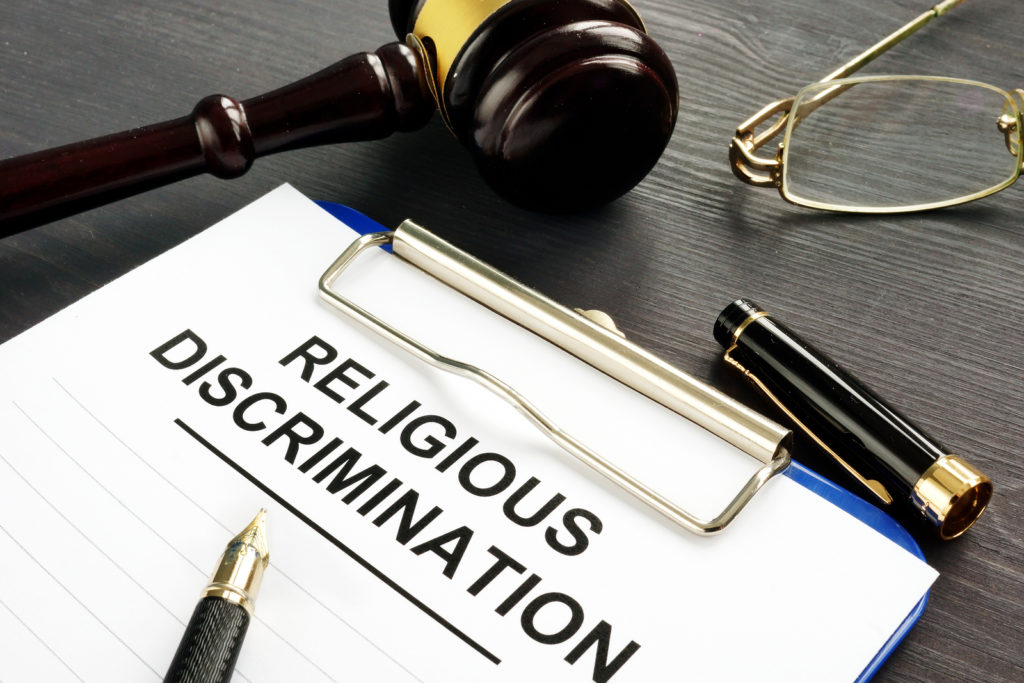Oct 17, 2019 | Constitutional Rights
Last year, we explained how the First Amendment affects bloggers. The laws and decisions that go into protecting bloggers may also affect rights regarding the first amendment and social media postings.
You may have encountered virulent arguments on social media about topics that should not have provoked that type of reaction. At some point, you or someone else may be accused of and reported for promoting “hate speech.” Maybe you just stated an opinion, and someone shot back an inflammatory comment. Does First Amendment cover you?

Defining hate speech
“Hate speech” isn’t a legal term, but is one used to describe speech that’s intended to attack or demean another individual or group. This type of speech is usually based on characteristics that are illegal to use for discrimination, such as race, sex, religion, nationality, sexual orientation, or age.
Hate speech has also come to mean any type of comment that another individual does not agree with, even if it’s not specifically insulting or demeaning.
Simply hurling insults at someone is offensive, but not against the law. But hate crimes, targeting someone because of the above characteristics, are a matter of criminal law, not civil.
What is social media?
Websites, apps and other forms of electronic communication allow people to communicate and share content in real time. Most people are familiar with Facebook, Twitter, Instagram, Pinterest, YouTube, and similar websites, as well as professional networking site Linkedin. Depending on the platform, you can disseminate any type of information to your friends, private groups or the user community at large.
When a post, picture, or other piece of content “goes viral,” it’s shared widely and occasionally appears in broadcast media. This can be anything from a cute cat video to a vicious diatribe targeting a group of individuals, and anything in between. With a combined social media user community in the billions, one share can put your post in front of the entire world in the blink of an eye.
While many social media users share pictures of whatever they’re doing, eating, drinking, or watching, hate groups use the same medium to disseminate their own messages. This is where the First Amendment and social media come into play.
The difference between the First Amendment and social media
Hate groups from all over the world have routinely used social media to spread their message, recruiting and bringing more people into their fold. The recent attack on a German synagogue was live-streamed on Twitch by the shooter wearing a helmet camera. But it wasn’t the first time social media has been used to broadcast such an event.
While the First Amendment protects your right to say what’s on your mind in a public forum, social media is a different matter. The platforms might be a public forum, but are privately owned by companies that issue their own policies for what you can and can’t say there.
For instance: standing in the public square and shouting insults will upset people of that you’re targeting, but the comments are constitutionally protected. However, threats of and encouraging violence, the so-called “fighting words,” are not constitutionally protected, and may also get you arrested.
Platform policies
Making the same comments on social media may be First Amendment protected, but may violate the platform’s “community standards.” This means that although your comments are constitutionally protected, the platform itself does not have to allow you to say it on their “premises.”
It’s akin to saying something insulting to someone in their own home. You can say it on the sidewalk, but they don’t have to allow you in to say it in the privacy of their living room. By the same token, social media companies have the right to tell you that you can’t say that on their privately owned platform. Users are allowed to “flag” comments that they believe to be hate speech, but flags are also used in retaliation for benign comments that someone simply disagreed with. This makes it more difficult to find true hate speech and combat it.
While social media companies have broad powers to restrict hate speech in their platforms, their capacity is lacking to catch and control everything that violates their community standards.
Have you been accused of hate speech?
Call the Civil Rights Litigation Group at (720) 515-6165, or use our online contact form, to schedule your free consultation with us today. As a civil rights defense firm, we will work to ensure that your civil rights are defended and protected.
Mar 20, 2019 | Constitutional Rights, Discrimination
Religion is a personal choice, no matter what the denomination. You may choose to share your beliefs with others, or you may keep them to yourself. You may also eschew religion if you choose to. But religious discrimination is not a choice your employer has a right to make.
One of the most demeaning forms of discrimination is on the basis of your choice of religion. Whether you grew up with your religion beliefs, or chose them later, it should never be used against you. If it is, your civil rights have been violated through religious discrimination. And in the workplace, you may have grounds for a lawsuit.
The First Amendment
What it actually says is:
Congress shall make no law respecting an establishment of religion, or prohibiting the free exercise thereof; or abridging the freedom of speech, or of the press; or the right of the people peaceably to assemble, and to petition the government for a redress of grievances.
There is no “national religion” in the U.S., as there are in other countries, nor limitations on the practice of religion.
Title VII of the Civil Rights Act of 1964 also prohibits employers from discriminating against employees.
Two types of religious discrimination
There are two general ways that you could be harassed based on your religion:
-
Quid Pro Quo, (Latin for “this and that”), when you are required to alter or abandon a religious belief in order to obtain employment, or an adverse action that occurs after you accept a position but refuse to change your beliefs.
-
A Hostile Work Environment, in which you are subjected to negative comments and/or actions that create a hostile work environment, and suffer a “negative employment action.” Employers are responsible for the actions of their employees.
There are some exceptions. Religious organizations, by their very nature, have the right to hire based on their own religious beliefs, especially if it’s activities are religious on a day-to-day basis. Clergy members are also prohibited from filing religious discrimination lawsuits, because doing so would allow the government to interfere in religious activities. They are not, however, exempt from other forms of discrimination, such as race based or sex based.
Proving religious discrimination
If you believe you are the victim of religious discrimination, it’s important to:
- Report each incident of religious discrimination to your employer
- Personally document each incident, as well as each time you report an incident
Should your employer fail to take corrective action, you can file a Claim of Discrimination with either the EEOC or the Colorado Civil Rights Division (CCRD). You’ll have 300 days from the act of religious discrimination in which to file your complaint with the EEOC, or 180 days with the CCRD. After that, you will lose your right to file your religious discrimination claim under Title VII or Colorado law.
The American Bar Association’s criteria for a prima facie case states that a plaintiff must show that:
- The harassment occurred because of, or was motivated by, religion
- The conduct was pervasive or severe
- The conduct had a detrimental effect on the plaintiff and
- The harassment would have had such an effect on a reasonable person of the same religion in that position
Once you successfully prove your claim of religious discrimination, there are a number of remedies available under the law. You may be awarded compensatory damages including lost wages and benefits, emotional distress, and occasionally, punitive damages. You may also be awarded attorney’s fees and litigation costs. The court could also require the company to reinstate you, and issue an injunction against the company barring them from committing further acts of discrimination.
An attorney who specializes in civil rights violations and employment or religious discrimination can help you navigate this complicated area of law.
Denver’s civil rights attorney
You have the right to your own religion, guaranteed by the First Amendment. Employment discrimination in any form is a difficult and complex area of the law. Need help? Call the Civil Rights Litigation Group at (720) 515-6165, or use our online contact form, to schedule your free consultation with us today. We’ll aggressively defend you in court and make sure your rights are protected under the First Amendment.
Feb 7, 2018 | Civil Rights Law, Constitutional Rights
A wrongful arrest (also called “false arrest”) can happen to anyone at any time. You may look like someone the police are looking for, you may have been misidentified by someone (intentionally or unintentionally) or just may be in the wrong place at the wrong time. An arrest can be embarrassing, particularly if you’re not guilty. But if it happens, here’s what you need to prove you that should not have been arrested.

Wrongful arrest is a violation of your Fourth Amendment protections against unlawful search and seizures. Both private citizens and law enforcement personnel can commit a wrongful arrest. You can also sue for damages by way of a civil lawsuit.
First: don’t resist an arrest
Even if you know you’re being wrongfully arrested, resisting arrest is also a crime. It may be legal to resist a wrongful arrest, but you can still be charged. You’ll still have the right to speak to an attorney, and the right to a fair trial to prove your innocence. Always be polite, and never threaten a law enforcement officer or another individual during the arrest process.
Your right to remain silent
Exercise this right, especially in the case of a wrongful arrest. Make sure you ask for and have an attorney available whenever you speak to the police. Don’t wait for them to read you the “Miranda Warning,” since anything you say at the time of arrest can also be used against you. Give no statements until you can speak to an attorney.
Decline any searches without warrants
Police have procedures they must follow when they obtain a search warrant. But if you permit a search without a warrant, your rights may not be respected. The Fourth Amendment protects you from unwarranted searches.
The “Citizen Arrest”
Private citizens can also commit a wrongful arrest by detaining you and not allowing you to leave, violating your Fourth Amendment rights. An example is a private security guard in a retail store detaining you for shoplifting without witnesses or other probable cause. If there is cause, a guard can detail you temporarily until the police arrive to take over. But detaining someone without cause becomes a wrongful arrest or false imprisonment.
The ACLU offers this guide to knowing and understanding your rights when dealing with law enforcement in the state of Colorado.
Proving wrongful arrest in court
You’ll need to make four points in your case:
- The individual in question intentionally confined or arrested you, preventing you from leaving and depriving you of your Fourth Amendment rights. This may be law enforcement or a private individual, such as a store manager or supervisor.
- That the plaintiff (you) was conscious of the confinement and understood that you were being confined, arrested and prevented from leaving.
- That the plaintiff (you) did not consent to being confined, and the arrest/confinement was done anyway.
- If the arrest was “privileged” or legally justified. This is usually when a warrant, court order, or probable cause is involved and can justify an otherwise wrongful arrest. While a warrant and a court order can make an arrest justified, probable cause is less clear and can prove that an arrest was, indeed, wrongful.
Probable Cause allows a police officer to make an arrest on someone if he or she has sufficient reason to believe at the time of the arrest that the individual has or intends to commit a crime. It does not matter if the individual is guilty of a crime — that’s addressed in court. Should an individual claim probable cause, they can use it as a defense for wrongful arrest.
Call us — we’ll fight for your rights
Wrongful arrests can happen to anyone, anytime. If you’ve been wrongfully arrested, or your civil rights have otherwise been violated, an experienced civil rights attorney will fight for your rights. Call the Civil Rights Litigation Group at (720) 515-6165. Schedule your free consultation with us today. We’ll defend you against wrongful arrests and other overreaching actions by police, and help you clear your name.




